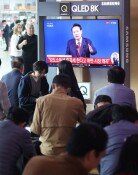How to win over younger voters
New Seoul Mayor Park Won-soon got twice as many votes from those in their 40s as Na Kyung-won, his competitor from the ruling Grand National Party. Park also got three times more votes than Na from those in their 30s and twice as many from 20-somethings. On the contrary, Na was popular among those in their 50s or older. Voters in their 20s, 30s and 40s have not always been like this. In the 2007 presidential election, they overwhelmingly voted for the conservative Lee Myung-bak over the liberal candidate Chung Dong-young. The ruling party must now urgently win back the hearts and minds of those in their 20s, 30s, and 40s.
Koreans in their 40s were born between 1962 and 1971 and attended college in the 1980s. Though they have vivid memories of pro-democracy protests in 1987, they experienced little difficulty in getting jobs in the booming economy. They experienced improvement of living standards for a while and managed to avoid layoffs because they were not managers during the 1997 Asian financial crisis. A few years ago, however, more of them began to suffer from soaring education costs and expensive college tuition for their children. They also failed to prepare for life after retirement. Those feeling insecure about their silver years seemed to have voted for change in the Seoul mayoral election.
Koreans in their 30s are more liberal than those in their 20s. In last year`s election for Seoul mayor, they formed the largest percentage of supporters for Han Myeong-sook, then the main opposition Democratic Party`s candidate. They were born between 1972 and 1981 and went to college in the 1990s, and quickly took up social networking services because they are the first generation to use computers at school. Suffering from the 1997 financial crisis, they had a tough time in getting jobs and weathering rising rents because they cannot afford to buy a house. Since they have young children, they are sensitive to pledges on free school meals and free childcare. They must be the ones who rushed to voting booths after work.
Those in their 20s were born from 1982 to 1991 and went to college in the 2000s. Though the majority of them went to college, they could hardly get jobs in the midst of jobless growth. They agree to pledges of half-priced college tuition and are interested in youth unemployment. Reduction of education costs is the top priority for 40-somethings, cutting housing rent and free school meals and childcare for 30-somethings, and alleviating youth unemployment for 20-somethings. The ruling Grand National Party must be aware of these problems, but none of them seems easy to solve.
Editorial Writer Song Pyeong-in (pisong@donga.com)
Headline News
- Korean president faces debate limitations unlike U.S. counterpart
- KEPCO's first quarter profits failed to meet market expectations
- Teenagers are left out of discussions about national pension
- 2 consultative bodies submit minutes regarding increasing number of medical students
- Woo Sang-hyuk's rivalry and friendship transcend borders







